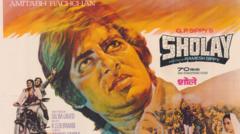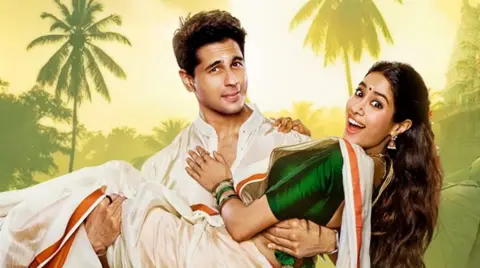In a remarkable revival, the legendary Hindi film "Sholay" arrives back in theaters, marking its 50th anniversary with a fully restored version that brings back the original ending. This significant cinematic event occurs at the Il Cinema Ritrovato Festival in Bologna, Italy, showcasing Ramesh Sippy's classic precisely as it was envisioned in 1975. Along with the film's uncut original ending—altered due to censorship—the restoration also includes deleted scenes that were never before seen by audiences.
"Sholay," renowned as one of the greatest Hindi films of all time, features a star-studded cast, including Amitabh Bachchan, Dharmendra, Hema Malini, and Amjad Khan, whose portrayal of the notorious bandit Gabbar Singh has sealed his place in cinematic history. Set in the fictional village of Ramgarh, the film follows two ex-cons, Jai and Veeru, tasked with capturing Gabbar Singh, reflecting a narrative arc of good versus evil that has cemented its status in Indian film culture.
When "Sholay" debuted, it initially faced harsh critiques and a shaky box office performance, struggling to connect with audiences. However, word of mouth quickly turned the tide, allowing the film to run for a record-breaking five years in theaters, accompanied by a collection of unforgettable dialogues and a score by RD Burman that has since become iconic. Over time, the film's figures and sayings became deeply ingrained in Indian society, affecting everything from weddings to political speeches.
The road to this restoration was fraught with difficulties; the original prints had largely deteriorated. Notably, in 2022, after considerable efforts, Shehzad Sippy, son of Ramesh Sippy, sought the expertise of the Film Heritage Foundation in Mumbai to recover crucial elements from various archives, including lost reels from the UK. The painstaking restoration, in collaboration with L'Immagine Ritrovata, managed to revive the film's visual splendor despite the challenges of damaged negatives.
As the film screens anew, its themes continue to resonate with audiences, emphasizing the timeless narrative of justice and moral triumph. Bachchan reflects on its relevance, pointing out the underlying journey of good conquering evil, a sentiment that transcends time and culture. As excitement builds for the festival's showings, "Sholay" not only emerges as a classic relic of the past but continues to evolve as a cherished part of India's cinematic heritage.
"Sholay," renowned as one of the greatest Hindi films of all time, features a star-studded cast, including Amitabh Bachchan, Dharmendra, Hema Malini, and Amjad Khan, whose portrayal of the notorious bandit Gabbar Singh has sealed his place in cinematic history. Set in the fictional village of Ramgarh, the film follows two ex-cons, Jai and Veeru, tasked with capturing Gabbar Singh, reflecting a narrative arc of good versus evil that has cemented its status in Indian film culture.
When "Sholay" debuted, it initially faced harsh critiques and a shaky box office performance, struggling to connect with audiences. However, word of mouth quickly turned the tide, allowing the film to run for a record-breaking five years in theaters, accompanied by a collection of unforgettable dialogues and a score by RD Burman that has since become iconic. Over time, the film's figures and sayings became deeply ingrained in Indian society, affecting everything from weddings to political speeches.
The road to this restoration was fraught with difficulties; the original prints had largely deteriorated. Notably, in 2022, after considerable efforts, Shehzad Sippy, son of Ramesh Sippy, sought the expertise of the Film Heritage Foundation in Mumbai to recover crucial elements from various archives, including lost reels from the UK. The painstaking restoration, in collaboration with L'Immagine Ritrovata, managed to revive the film's visual splendor despite the challenges of damaged negatives.
As the film screens anew, its themes continue to resonate with audiences, emphasizing the timeless narrative of justice and moral triumph. Bachchan reflects on its relevance, pointing out the underlying journey of good conquering evil, a sentiment that transcends time and culture. As excitement builds for the festival's showings, "Sholay" not only emerges as a classic relic of the past but continues to evolve as a cherished part of India's cinematic heritage.



















